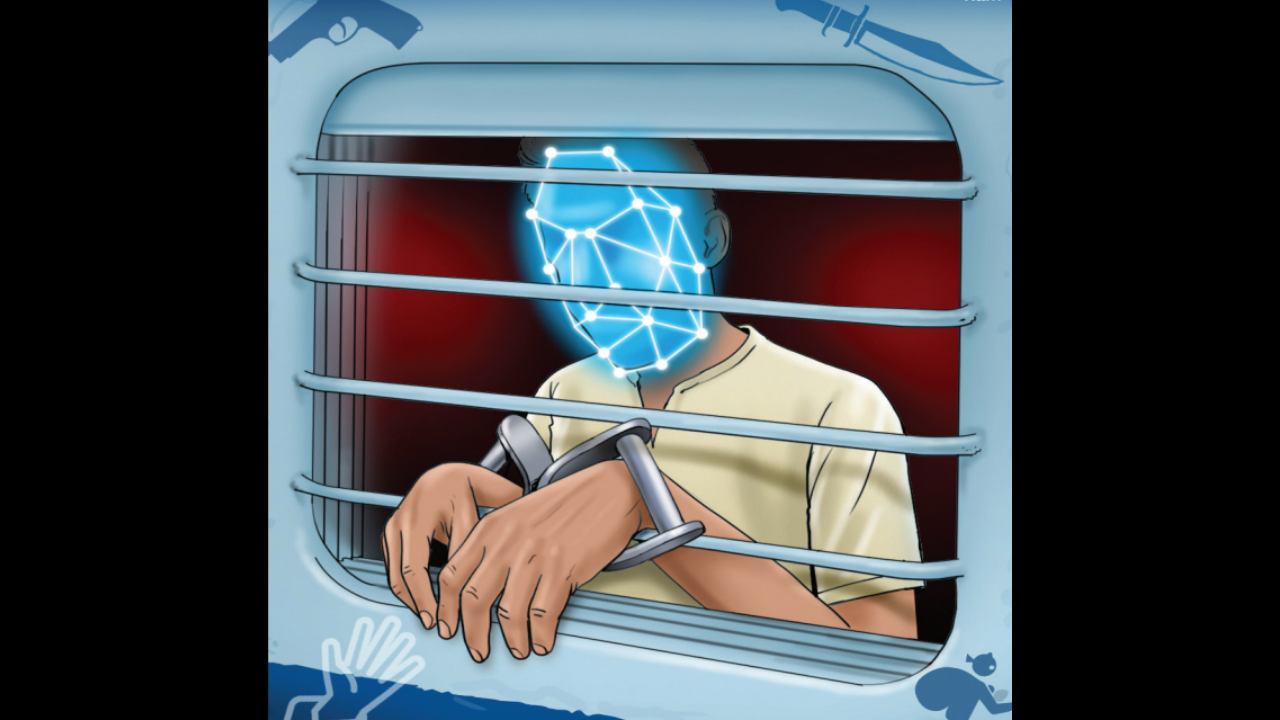[ad_1]
MUMBAI: The detection rate of crimes on Mumbai Railways has improved from 15% in January-August 2019 (pre-Covid times) to 40% in the same period this year. Meanwhile, overall crimes reported in the first eight months of this year (10,360 cases) have increased by 16% compared with the same period in 2022 (8,885 cases), though they are still half of pre-Covid numbers.
Government Railway Police (GRP) officials said cameras equipped with facial recognition systems are playing a key role in solving crimes faster and more accurately, besides traditional forms of policing. The system works by matching the faces of people walking past special cameras to pictures of individuals on a watch list.
Under the facial recognition system (FRS), a camera detects and locates the image of a face. It is captured and analyzed to identify the facial landmarks that are key to distinguishing one’s face. Key factors include the distance between a person’s eyes, distance between the forehead and chin, the contour of ears and lips, among others. This ‘faceprint’ is then compared with a database to find a match.
Of the total Indian Penal Code (IPC) recorded in the first eight months of this year, 9,800 cases pertained to theft, including pickpocketing, chain-snatching, phone theft and so on. The detection rate for thefts is 38%, which is up from 7% in 2019. For serious offences such as murder and kidnapping too, detection rates have increased (see graphic). The only exception is robbery offences where the detection rate has dipped from 95% in January-August 2019 to 83% in the same period this year.
On the railways, GRP officials coordinate with the Railway Protection Force who are custodians of FRS. The system has been used for solving a range of other offences. “For instance, a man steals a commuter’s bag and is captured on camera. Investigators can enter the relevant images into the FRS and create a file. Whenever the suspect enters railway premises next and is captured on camera again, the system finds a match with the images previously entered. An alert is sent out. The monitoring team immediately dispatches information to patrolling personnel positioned closest to the suspect and he is caught,” said an investigating officer who did not wish to be named. A verification of the suspect is conducted to rule out any room for error.
The GRP is also pushing for cameras to be mounted on the front exterior of trains to gather strong evidence in instances of track deaths. Deaths due to crossing of tracks are the leading reason for casualties on railways. “Camera grabs can clearly distinguish whether a track death is accidental, a suicide or homicide and the investigation can be concluded sooner,” said a senior IPS officer.
But while crimes have started to increase, manpower has been the same for decades. “The strength of the force must increase proportionately,” said activist Subhash Gupta of Rail Yatri Parishad. Gupta suggested that while heading home after duty, police personnel could commute in uniforms as it would have a deterrent effect on criminal elements.
Government Railway Police (GRP) officials said cameras equipped with facial recognition systems are playing a key role in solving crimes faster and more accurately, besides traditional forms of policing. The system works by matching the faces of people walking past special cameras to pictures of individuals on a watch list.
Under the facial recognition system (FRS), a camera detects and locates the image of a face. It is captured and analyzed to identify the facial landmarks that are key to distinguishing one’s face. Key factors include the distance between a person’s eyes, distance between the forehead and chin, the contour of ears and lips, among others. This ‘faceprint’ is then compared with a database to find a match.
Of the total Indian Penal Code (IPC) recorded in the first eight months of this year, 9,800 cases pertained to theft, including pickpocketing, chain-snatching, phone theft and so on. The detection rate for thefts is 38%, which is up from 7% in 2019. For serious offences such as murder and kidnapping too, detection rates have increased (see graphic). The only exception is robbery offences where the detection rate has dipped from 95% in January-August 2019 to 83% in the same period this year.
On the railways, GRP officials coordinate with the Railway Protection Force who are custodians of FRS. The system has been used for solving a range of other offences. “For instance, a man steals a commuter’s bag and is captured on camera. Investigators can enter the relevant images into the FRS and create a file. Whenever the suspect enters railway premises next and is captured on camera again, the system finds a match with the images previously entered. An alert is sent out. The monitoring team immediately dispatches information to patrolling personnel positioned closest to the suspect and he is caught,” said an investigating officer who did not wish to be named. A verification of the suspect is conducted to rule out any room for error.
The GRP is also pushing for cameras to be mounted on the front exterior of trains to gather strong evidence in instances of track deaths. Deaths due to crossing of tracks are the leading reason for casualties on railways. “Camera grabs can clearly distinguish whether a track death is accidental, a suicide or homicide and the investigation can be concluded sooner,” said a senior IPS officer.
But while crimes have started to increase, manpower has been the same for decades. “The strength of the force must increase proportionately,” said activist Subhash Gupta of Rail Yatri Parishad. Gupta suggested that while heading home after duty, police personnel could commute in uniforms as it would have a deterrent effect on criminal elements.
[ad_2]
Source link






Join The Discussion